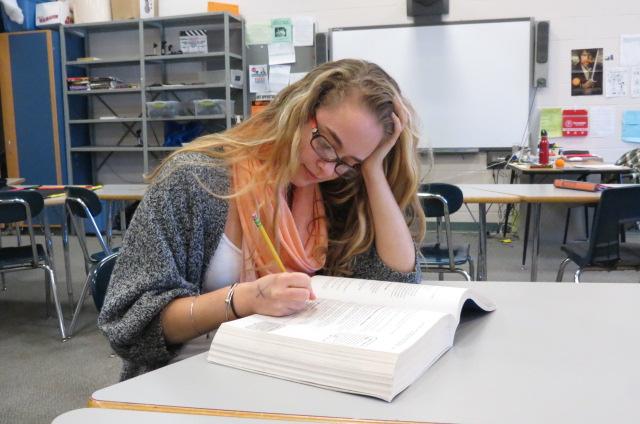Exam Overload?
Administrators and Teachers Question if Students are Taking Too Many Tests
Photo by Liam Russo
In this photo illustration, Staff Writer Zoe Calianos studies hard for the SATs. There is recent debate as to whether students are being tested too much.
April 28, 2014
With MCAS, AP tests, SATs and finals on the horizon; students can feel smothered with textbooks, worksheets, and seemingly endless amounts of stress. Some are staying up to ridiculous hours of the night just to get a study session in.
Testing is evolving and students aren’t the only ones noticing. “We’re giving students mid-terms, MCAS, AP tests, and finals. It gets to a point where we need to find a different way to evaluate our students,” said Vice Principal Scott Pyy.
Mr. Carl Lopes, head of the art department, said,“testing alone isn’t the problem; what’s hard on students is the amount of testing. Giving a test every once in a while is one thing, but over-testing can cause serious stress among students.” He continued to explain the effects that over-testing can have on creativity. “I think the amount of required testing is keeping students from taking the creative electives that this school offers, which ultimately holds them back from expressing themselves.”
“It’s hard,” said Sabrina Davila, senior and honor roll student. “Looking back on my high school career, there were so many times I felt overwhelmed by the tests I was taking and the expectations I had to meet to pass them,” she said.
Sophomore Isabelle Dee agreed, “Testing is definitely too hard on students as it is,” she said, “Students should be graded on the quality of work that they put into the class, not on the information they remember when they’re taking a test.”
It seems like change could be on the way. Pyy said, “Barnstable High School is only responsible for the mid-terms and finals, but as far as standardized tests go, a change is coming.”
The change Pyy is referring to is the new PARCC test, which is replacing MCAS testing. Barnstable High School has been selected for a field test of the new computer based exam. The PARCC test takes elements of English and algebra to supposedly make more practical, realistic questions in determining students’ capabilities for graduating high school.
“With all of the changes regarding PARCC and the SAT, hopefully a change regarding mid-terms and finals will be taken into consideration,” said Pyy. “The mid-term and the final both count for ten percent of a student’s grade. Together, they’re equal to a whole term. Is that a true reflection of the student’s potential?”
“It should be quality over quantity,” he continued. “Instead of a three-hour exam with just pencil and paper, why not a final project at the end of the year that reflects the student’s dynamics and individuality?”
Pyy explained that a project could certainly be more lenient than a standardized test, with a wide array of possibilities rather than a set series of questions. It would allow students to express their knowledge in an original way that suits each one’s unique style of learning.
“I believe there’s a value in each of the tests that we give,” said history and psychology teacher Mr. Peter Goode. “Mid-terms and finals validate what you’ve learned for the year,” he continued. “However, I’m open to improvement on the way that we give the mid-terms and finals.”
“Whatever happens with school testing, I think it’ll be beneficial to leave the standardized exam behind,” said Davila. “A test with fill-in bubbles and ‘true or false’ shouldn’t be able to define your intellect, and it definitely shouldn’t determine your worth as a student.”


